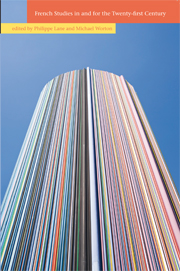Book contents
- Frontmatter
- Contents
- Notes on Contributors
- Foreword by Baroness Jean Coussins
- Foreword by His Excellency Bernard Emié
- Part I Contextualisations
- Part II Research and Public Engagement Strategies
- 3 The exception anglo-saxonne? Diversity and Viability of French Studies in the UK
- 4 Why French Studies Matters: Disciplinary Identity and Public Understanding
- 5 Learning from France: The Public Impact of French Scholars in the UK since the Second World War
- Part III The Place of Women and Gender in French Studies
- Part IV The Place of Literature
- Part V The Place of Linguistics in French Studies Today
- Part VI Theatre, Cinema and Popular Culture
- Part VII Area Studies, Postcolonial Studies and War and Culture Studies
- Part VIII Adventures in Language Teaching
- Appendices. Addresses to the Future of French Studies Conference
- Index
5 - Learning from France: The Public Impact of French Scholars in the UK since the Second World War
from Part II - Research and Public Engagement Strategies
- Frontmatter
- Contents
- Notes on Contributors
- Foreword by Baroness Jean Coussins
- Foreword by His Excellency Bernard Emié
- Part I Contextualisations
- Part II Research and Public Engagement Strategies
- 3 The exception anglo-saxonne? Diversity and Viability of French Studies in the UK
- 4 Why French Studies Matters: Disciplinary Identity and Public Understanding
- 5 Learning from France: The Public Impact of French Scholars in the UK since the Second World War
- Part III The Place of Women and Gender in French Studies
- Part IV The Place of Literature
- Part V The Place of Linguistics in French Studies Today
- Part VI Theatre, Cinema and Popular Culture
- Part VII Area Studies, Postcolonial Studies and War and Culture Studies
- Part VIII Adventures in Language Teaching
- Appendices. Addresses to the Future of French Studies Conference
- Index
Summary
‘L'intellectuel est quelqu'un qui se mêle de ce qui ne le regarde pas.’ Sartre's canonical definition of the intellectual suggests a basic question about the public impact of French scholars. To what extent have they intervened in British society, and how far have they stepped outside their areas of expertise to do so? In attempting to answer this question, the following discussion examines how scholars of French have engaged in activities that have shaped different aspects of life in the UK beyond the world of French Studies. Examining the current debate around the question of public impact, it will look at the work of scholars in bringing French intellectual life to a wider public; at their educational role in influencing public policy especially in respect of languages, and at their involvement in broader social and political movements.
The Impact Debate
French has been a focus of degree level study and scholarly research at British universities for more than a century. Throughout this time, there have been recurrent debates about whether the study of French should be expected to serve social objectives. To some extent, they have reflected wider public concerns that universities should produce useful knowledge, encapsulated in the radical utilitarianism of Jeremy Bentham. The social objectives suggested for French have included economic, political and cultural aims, mainly according to the state of Franco-British relations at any one time, and to a lesser extent, the relations between Britain and the wider French-speaking world.
- Type
- Chapter
- Information
- French Studies in and for the 21st Century , pp. 58 - 72Publisher: Liverpool University PressPrint publication year: 2011



